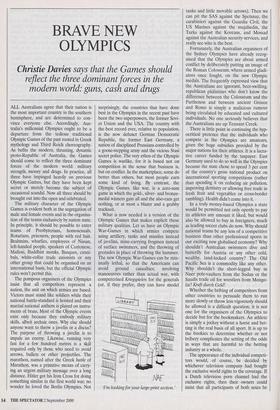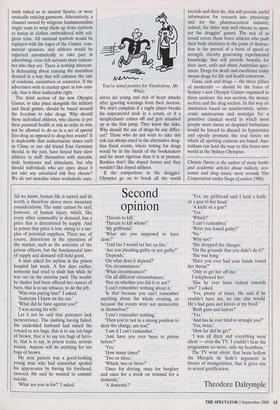BRAVE NEW OLYMPICS
Christie Davies says that the Games should
reflect the three dominant forces in the modern world: guns, cash and drugs
ALL Australians agree that their nation is the most important country in the southern hemisphere, and are determined to con- vince everyone else. Accordingly, Aus- tralia's millennial Olympics ought to be a departure from the tedious traditional Olympic Games of the past rooted in Greek mythology and Third Reich choreography. As befits the modern, thrusting, dynamic proto-Republic of Australia, the Games should come to reflect the three dominant forces of the modern world: military strength, money and drugs. In practice, all three have impinged heavily on previous Olympic Games, but they have been kept secret or merely become the subject of occasional scandal. Now all three should be brought out into the open and celebrated.
The military character of the Olympic Games is evident both in the segregation of male and female events and in the organisa- tion of the teams exclusively by nation state. In principle, it should be possible to enter teams of Presbyterians, homosexuals, Rotarians, prisoners, people with red hair, Brahmins, wharfies, employees of Nissan, left-handed people, speakers of Cantonese, Mafiosi, Buddhist monks, Basques, canni- bals, white-collar trade unionists or any other group that could be organised on an international basis, but the official Olympic rules won't permit this.
The pompous organisers of the Olympics insist that all competitors represent a nation, the unit on which armies are based. Victors must stand like soldiers while their national battle-standard is hoisted and their martial national anthem is played on instru- ments of brass. Most of the Olympic events exist only because they embody military skills, albeit archaic ones. Why else should anyone want to throw a javelin or a discus? The purpose of throwing a javelin is to impale an enemy. Likewise, running very fast for a few hundred metres is a skill required only by those who need to avoid arrows, bullets or other projectiles. The marathon, named after the Greek battle of Marathon, was a primitive means of carry- ing an urgent military message over a long distance. Hitler got his Iron Cross for doing something similar in the first world war; no wonder he loved the Berlin Olympics. Not
surprisingly, the countries that have done best in the Olympics in the recent past have been the two superpowers, the former Sovi- et Union and the USA. The country with the best record ever, relative to population, is the now defunct German Democratic Republic, the former East Germany, a nation of disciplined Prussians controlled by a goose-stepping army and the vicious Stasi secret police. The very ethos of the Olympic Games is warlike, for it is baSed not on competition in the sense that business is, but on conflict. In the marketplace, some do better than others, but most people earn some kind of living. By contrast, the Olympic Games, like war, is a zero-sum game in which the gold-, silver- and bronze- medal winners gain all and the also-rans get nothing, or at most a blazer and a grubby tracksuit.
What is now needed is a version of the Olympic Games that makes explicit these military qualities. Let us have an Olympic War-Games in which armies compete using artillery, tanks and missiles instead of javelins, mine-carrying frogmen instead of surface swimmers, and the throwing of grenades in place of throwing the hammer. The new Olympic War-Games can be min- imally lethal, so that the Americans can avoid ground casualties; involving manoeuvres rather than actual war, with computerised Kriegspielen for the generals (or, if they prefer, they can have model 'I'm looking for your large print section.' tanks and little movable arrows). Then we can pit the SAS against the Spetsnaz, the carabinieri against the Guardia Civil, the US Marines against the mujahedin, the Turks against the Koreans, and Mossad against the Australian security services, and really see who is the best.
Fortunately, the Australian organisers of the Sydney Olympics have already recog- nised that the Olympics are about armed conflict by deliberately putting an image of the Roman Colosseum, where armed gladi- ators once fought, on the new Olympic medals. The frequently expressed view that the Australians are ignorant, beer-swilling, republican philistines who don't know the difference between the Colosseum and the Parthenon and between ancient Greece and Rome is simply a malicious rumour being circulated by educated and cultured individuals. No one seriously believes that the Australians are up Tennant Creek.
There is little point in continuing the hyp- ocritical pretence that the individuals who compete in the Olympics are amateurs, given the huge subsidies provided by the major nations for their athletes. It is a lucra- tive career funded by the taxpayer. East Germany used to do so well in the Olympics because the state chose to spend 3 per cent of the country's gross national product on international sporting competitions (rather than spending it on reducing air pollution, improving dentistry or allowing free trade in fresh fruit and vegetables or cross-border rambling). Health didn't come into it.
In a truly money-based Olympics a state would be permitted not only openly to pay its athletes any amount it liked, but would also be allowed to buy in foreigners, much as leading soccer clubs do now. Why should national teams be any less of a competitive business than other professional sports in our exciting new globalised economy? Why shouldn't Australian swimmers dive and butterfly for Austria or any other cold, wealthy, land-locked country? The Old Pacific Sea is a commodity like any other. Why shouldn't the short-legged buy in Nuer pole-vaulters from the Sudan or the Saudis trade oil for wrestlers from Mongo- lia? Kraft durch Geld!
Whether the bribing of competitors from other countries to persuade them to run more slowly or throw less vigorously should be allowed is a difficult question; it is not one for the organisers of the Olympics to decide but for the bookmakers. An athlete is simply a jockey without a horse and bet- ting is the real basis of all sport. It is up to the bookies to determine whether or not bribery complicates the setting of the odds in ways that are harmful to the betting industry as a whole.
The appearance of the individual competi- tors would, of course, be decided by whichever television company had bought the exclusive world rights to the coverage. If a Dutch television porn channel had the exclusive rights, then their owners could insist that all participants of both sexes be stark naked as in ancient Sparta, or wear erotically enticing garments. Alternatively, a channel owned by religious fundamentalists might want to wrap them up from eyebrow to instep in clothes embroidered with reli- gious texts. All national symbols would be replaced with the logos of the Games' com- mercial sponsors, and athletes would be expected automatically to take part in advertising; even rich servants must remem- ber who they are. There is nothing inherent- ly demeaning about running the marathon dressed in a way that will enhance the sale of condoms, cucumbers or cosmetics. If the advertisers wish to market sport as low com- edy, that is their inalienable right.
The third section of the new Olympic Games, to take place alongside the military and fiscal games, should be based around the freedom to take drugs. Why should those individual athletes, who choose to put their personal health at risk in order to win, not be allowed to do so in a set of special free-drug as opposed to drug-free events? It is deplorable that authoritarian states such as China or our old friend East Germany should, in the past, have forced their slave athletes to stuff themselves with steroids, male hormones and stimulants, but why should individuals who are open about it not take any calculated risk they choose? We do not moralise when workaholic exec- 'You 've tested positive for Nandrolone, Mr.
Whizz.'
utives die young and rich of heart attacks after ignoring warnings from their doctors. We don't complain if a rugby player breaks his unprotected neck in a scrum, or if a steeplechaser comes off and gets smashed up at the first jump. They know the risks. Why should the use of drugs be any differ- ent? Those who do not want to take this risk can always enrol in the alternative drug- free fiscal events, where testing for drugs would be in the hands of the bookmakers and far more rigorous than it is at present. Bookies don't like doped horses and they wouldn't like doped athletes.
If the competitors in the druggies' Olympics go on to break all the world records and then die, this will provide useful information for research into physiology and for the pharmaceutical industry; indeed, the latter may well choose to spon- sor the druggies' games. The rest of us would revere those brave athletes who push their body chemistry to the point of destruc- tion in the pursuit of a burst of speed or strength, thereby generating experimental knowledge that will provide benefits for their inert, unfit and obese Australian spec- tators. Drugs for death and excellence today means drugs for life and health tomorrow.
Guns, cash and drugs — the three pillars of modernity — should be the bases of Sydney's new Olympic Games organised in three sections: the war section, the money section and the drug section. In this way an institution based on anachronistic, aristo- cratic amateurism and nostalgia for a primitive classical world in which most people were slaves or despised barbarians would be forced to discard its hypocrisies and openly promote the real forces on which all sporting contests are based. Aus- tralians can lead the way to this brave new world at the Sydney Olympics.
Christie Davies is the author of many books and academic articles about military, eco- nomic and drug issues, most recently The Corporation under Siege (London 1998).



























































 Previous page
Previous page